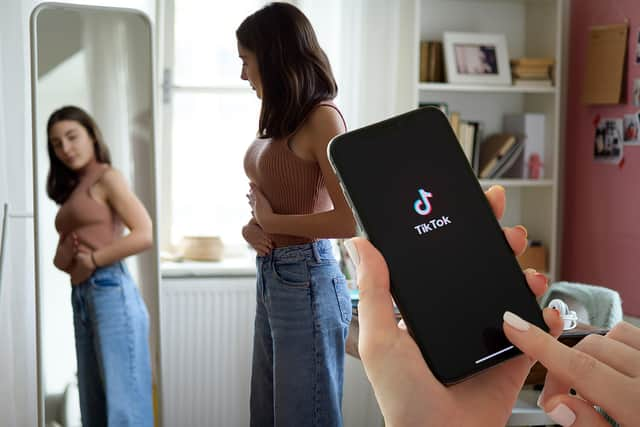Videos ‘promoting’ eating disorders ‘common’ on social media apps like TikTok, charity says
and live on Freeview channel 276
Pro-eating disorder videos are abundant on social media apps like TikTok, a charity has warned, as new research shows the number of young girls being diagnosed with conditions such as anorexia and bulimia has soared.
Beat, the UK’s leading eating disorder charity, told NationalWorld that posts “promoting weight loss, calorie counting, and behaviours linked to disordered eating” are still “very common” on TikTok - despite a report from last year which warned that the short-form video platform was promoting eating disorder content to young people “within minutes” of creating an account.
Advertisement
Hide AdAdvertisement
Hide AdWarning: This article contains discussion of eating disorders. If you or someone you know needs support with this topic, you can find contact information about organisations which can help at the end of the article.
In December 2022, the Centre for Countering Digital Hate (CCDH) conducted a study in which it created four ‘teenager’ accounts on TikTok and analysed the videos recommended on the ForYou page. Researchers found that content concerning “junkorexia”, insecurities about body weight and image, examples of low-calorie diets, and promotions of disordered eating quickly showed up.
At the earliest, eating disorder videos were recommended within just eight minutes of joining the app - and in most cases, within half an hour. The CCDH also flagged that it found “more vulnerable” young people were targeted more quickly than their “less vulnerable” counterparts, as when the study set up usernames containing the phrase “loseweight” with a stated age of 13, eating disorder content was shown around every three minutes.
Commenting on the report, a spokesperson from TikTok told NationalWorld that academics had highlighted serious concerns with the methodology used - and that they did not feel the CCDH’s approach reflected genuine behaviour or viewing experiences of real people. It also argued that the report did not distinguish between negative and positive content relating to eating disorders - such as posts about recovery and support.
Advertisement
Hide AdAdvertisement
Hide Ad

The app did however review the posts mentioned in the report, it told NationalWorld, and removed content found to violate its Community Guidelines. This included, according to a spokesperson, updating TikTok’s list of hashtags which are banned or have a safety label attached.
But charities such as Beat are still concerned about some of the eating disorder-related content on TikTok. It explained that while “a person wouldn’t develop an eating disorder just by watching videos online”, being exposed to this content can “worsen an existing eating disorder or contribute to an eating disorder developing if somebody is already vulnerable.” It added: “TikTok must urgently remove damaging content, signpost its users to support, and protect its users from harm.”
The comments come after a new study, published in the Lancet Child and Adolescent Health Journal, revealed that the significant increase in the number of teenage girls being diagnosed with eating disorders in the years since the pandemic.
Experts who conducted the research examined anonymised GP health records of more than 9 million children and young people aged between 10 to 24. Looking at records from 2010 to 2023, they found that from March 2020 - when the pandemic hit - eating disorders such as anorexia nervosa or bulimia were 42% higher than expected for girls between 13 and 16 and 32% higher than expected for girls between 17 and 19.
Advertisement
Hide AdAdvertisement
Hide AdBeat backed up these findings, reporting that calls to its helpline had increased by 300% during the pandemic - which also included an increase in contact from boys and young men. “During this time,” it told NationalWorld, “many people had heightened feelings of stress, anxiety, and isolation and the NHS experienced a huge increase of people needing help with an eating disorder.”
The charity also highlighted concerns about a “postcode lottery of care” which had been revealed in the report in the Lancet Journal, as girls from more well-off backgrounds were more likely to be diagnosed - indicating that those in more deprived areas were less likely to be able to access help.
“Eating disorders affect 1.25 million people of all backgrounds, genders, and ages, and it’s crucial that every person is able to get the help they deserve quickly, no matter where they live,” a spokesperson commented.
Dr Pearl Mok from the University of Manchester, lead author of the study, said: “The reasons for the increase in eating disorder diagnoses amongst teenage girls during the pandemic are likely to be complex and could be due to a mixture of issues such as social isolation, anxiety resulting from changing routines, disruption in education, unhealthy social media influences, and increased clinical awareness.”
Advertisement
Hide AdAdvertisement
Hide Ad

On its approach to eating disorder content, a TikTok spokesperson told NationalWorld: “Many people struggling with eating disorders or on a recovery journey come to TikTok for support, and we aim to help them do so safely.
“Our Community Guidelines are clear that we do not allow content showing or promoting disordered eating or any dangerous weight loss behaviours. We regularly consult with health experts, remove violations of our policies, and provide access to supportive resources for anyone in need.”
The app added that last year it expanded its policies on disordered eating, and between October and December 2022, of the videos it removed for violating policies, 85.4% were removed before they were even reported and 75.2% were removed within 24 hours of being reported.
A spokesperson explained that one of the key challenges is that content on TikTok is constantly evolving - as people change the language they are using to evade the app’s safeguards. Some modify #edtok to #edtøk, and another popular approach reported by the CCDH for avoiding content moderation is to co-opt singer Ed Sheeran’s name by writing #EdSheeranDisorder.
Advertisement
Hide AdAdvertisement
Hide AdBut TikTok said it is always working to update its safeguards and ensure it promptly removes negative content while also allowing positive content - such as information about recovery - to remain on the app so that it can be a forum people come to for “support”. To further this, the app provides in-app resources which direct people to places such as the Beat helpline when they are searching for words or phrases like #anorexia.
Comment Guidelines
National World encourages reader discussion on our stories. User feedback, insights and back-and-forth exchanges add a rich layer of context to reporting. Please review our Community Guidelines before commenting.
